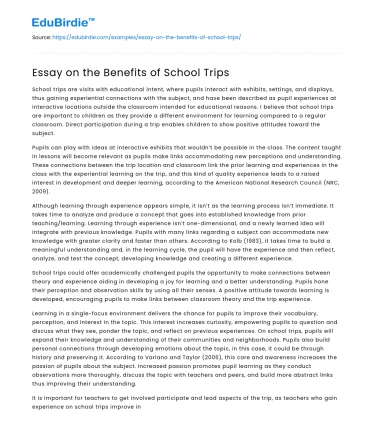School trips are visits with educational intent, where pupils interact with exhibits, settings, and displays, thus gaining experiential connections with the subject, and have been described as pupil experiences at interactive locations outside the classroom intended for educational reasons. I believe that school trips are important to children as they provide a different environment for learning compared to a regular classroom. Direct participation during a trip enables children to show positive attitudes toward the subject.
Pupils can play with ideas at interactive exhibits that wouldn’t be possible in the class. The content taught in lessons will become relevant as pupils make links accommodating new perceptions and understanding. These connections between the trip location and classroom link the prior learning and experiences in the class with the experiential learning on the trip, and this kind of quality experience leads to a raised interest in development and deeper learning, according to the American National Research Council (NRC, 2009).
Save your time!
We can take care of your essay
- Proper editing and formatting
- Free revision, title page, and bibliography
- Flexible prices and money-back guarantee
Although learning through experience appears simple, it isn’t as the learning process isn’t immediate. It takes time to analyze and produce a concept that goes into established knowledge from prior teaching/learning. Learning through experience isn’t one-dimensional, and a newly learned idea will integrate with previous knowledge. Pupils with many links regarding a subject can accommodate new knowledge with greater clarity and faster than others. According to Kolb (1983), it takes time to build a meaningful understanding and, in the learning cycle, the pupil will have the experience and then reflect, analyze, and test the concept, developing knowledge and creating a different experience.
School trips could offer academically challenged pupils the opportunity to make connections between theory and experience aiding in developing a joy for learning and a better understanding. Pupils hone their perception and observation skills by using all their senses. A positive attitude towards learning is developed, encouraging pupils to make links between classroom theory and the trip experience.
Learning in a single-focus environment delivers the chance for pupils to improve their vocabulary, perception, and interest in the topic. This interest increases curiosity, empowering pupils to question and discuss what they see, ponder the topic, and reflect on previous experiences. On school trips, pupils will expand their knowledge and understanding of their communities and neighborhoods. Pupils also build personal connections through developing emotions about the topic, in this case, it could be through history and preserving it. According to Variano and Taylor (2006), this care and awareness increases the passion of pupils about the subject. Increased passion promotes pupil learning as they conduct observations more thoroughly, discuss the topic with teachers and peers, and build more abstract links thus improving their understanding.
It is important for teachers to get involved participate and lead aspects of the trip, as teachers who gain experience on school trips improve in their functional and pertinent view of teaching skills and constructivist education.
Summing up, in my opinion, school trips play a significant role in the educational process, contributing to better assimilation of knowledge acquired during lessons and strengthening students' interest in the subject. That is why their organization should be a regular practice of the educational process.






 Stuck on your essay?
Stuck on your essay?

